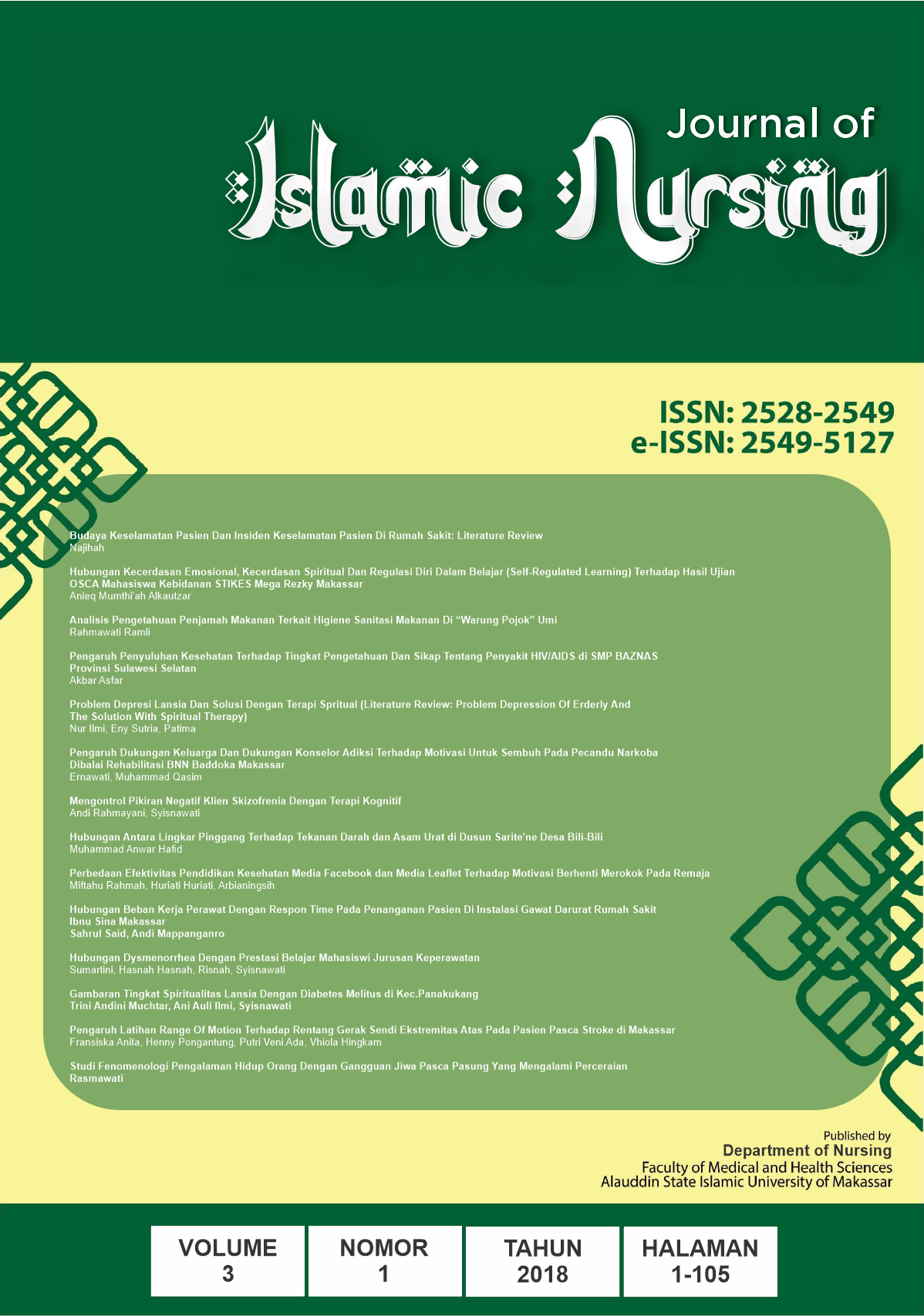STUDI FENOMENOLOGI PENGALAMAN HIDUP ORANG DENGAN GANGGUAN JIWA PASCA PASUNG YANG MENGALAMI PERCERAIAN
Abstract
Pasung as an inhumane act can lower dignity and reduce the quality of life of people with mental illness., They need family support, especially by a spouse to achieve recovery and return to productive. The conditions of divorce and neglect by the living environment can cause problems for people with mental illness. The purpose of this study was to describe the experiences of people with mental illness in living post-pasung life without the support of a spouse.
Method: research uses qualitative design with phenomenological approach to explore the life experiences of participants after being abandoned by their wives. Four Participants were chosen by purposive sampling method. Data collection was carried out by in-depth interviews then analyzed by the Colaizzi method.
Results: The divorce experienced has an impact on the lives of participants. Two themes produced from this study are grieving in response to financial separation and limitations as obstacles to building a new family.
Conclusion: Divorce leaves a deep sadness forpeople winth mental illness so that assistance is needed from family, community and health workers during the grieving process and during the recovery process.
Downloads
References
Puteh I, . 2011. Marthoenis M, Minas H. Aceh Free Pasung: Releasing the mentally ill from physical restraint. International Journal of Mental Health Systems.; 5: 10.
Suharto, B. 2014. Budaya Pasung dan Dampak Yuridis Sosiologis (Studi Tentang Upaya Pelepasan Pasung dan Pencegahan Tindakan Pemasungan di Kabupaten Wonogiri). IJMS - Indonsian Journal on Medical Science.; 1(2)
Fitriani L. 2015. Pemasungan Terhadap Orang Dengan Masalah Kejiwaan Dan Gangguan Jiwa Bertentangan Dengan Peraturan Perundang-Undangan. Jurnal RechtsVinding Online.
Lestari, W & Wardhani, Y. F. 2014. Stigma dan penanganan penderita gangguan jiwa berat yang dipasung. Buletin Penelitian Sistem Kesehatan,17 (2) 157–166.
Aini, S. Q. 2013. Faktor Penyebab Gangguan Jiwa pada Penderita (Psikotik) yang Dipasung di Kabupaten Pati. Litbang Pati. Retrieved from http://litbang.patikab.go.id/index.php/jurnal/247-faktor-faktor-yangberhubungan-dengan-persalinan-sectio-caesarea-di-kabupaten-pati-studipada-rsud-raa-soewondo-dan-rumah-sakit-islam-pati/192-faktor-penyebabgangguan-jiwa-pada-penderita-psikotik-yang-dipasung-di-kabupaten-pati
Kementerian Kesehatan RI. 2013. Riset kesehatan dasar. Jakarta: Badan Penelitian dan Pengembangan Kesehatan.
Guan, L., Liu, J., Wu, X. M., Chen, D., Wang, X., Ma, N., … Good, M.-J. 2015. Unlocking patients with mental disorders who were in restraints at home: anational follow-up study of China’s new public mental health initiatives. PloS One, 10(4), e0121425. http://doi.org/10.1371/journal.pone.0121425
Marco, C. A., & Vaughan, J. (2005). Emergency management of agitation in schizophrenia. American Journal of Emergency Medicine, 23(6), 767–776. http://doi.org/10.1016/j.ajem.2005.02.050
Adeosun, I. I., Adegbohun, A. A., Jeje, O. O., & Adewumi, T. A. 2014. Experiences of discrimination by people with schizophrenia in Lagos, Nigeria. Journal of Public Mental Health, 13(4), 189–196. http://doi.org/http://dx.doi.org/10.1108/JPMH-06-2013-0038
Kementerian Kesehatan Republik Indonesia 2015. Perlakuan bermartabat bantu pulihkan gangguan jiwa. Retrieved from http://www.depkes.go.id/article/view/15101900005/perlakuan-bermartabatbantu-pulihkan-gangguan-kejiwaan.html
Mugianti, S & Suprajitno. 2014. Prediksi Penderita Gangguan Jiwa Dipasung Keluarga. Jurnal Ners, 9(1) 118–125.
Risna,. Mudatsir,. Kamil, H. Jannah, S.R., Tahlil., (2017). Stigma Keluarga terhadap Penderita Skizofrenia Ditinjau dari Aspek Sosial Budaya dengan Pendekatan Sunrise Model. Prosiding Seminar Nasional Pascasarjana (SNP) Unsyiah 2017
Amelia, D. & Anwar, Z. 2013. Relaps Pada Pasien Skizofrenia. Jurnal Ilmiah Psikologi Terapan. 01(01) 52-64
Dharma, K. K. 2011. Metodologi penelitian keperawatan panduan melaksanakan dan menerapkan hasil penelitian. Jakarta: Trans Info Media
Polit, D. F. & Beck, C. T. 2012. Nursing research generating and assessing evidence for nursing practice. China: Lippincott Williams & Wilkins
Creswell, J. H. 2013. Qualitatif Inquiry & Research Design third edition. United States of America: Sage Publication.
Dariyo, A. 2004. Memahami Psikologi Perceraian Dalam Kehidupan Keluarga . Jurnal Psikologi Vol. 2 No. 2,
Fu, T. S., Lee, C., Gunnell, D., Lee, W., & Cheng, A. T. 2013. Changing trends in the prevalence of common mental disorders in taiwan: A 20-year repeated cross-sectional survey. The Lancet, 381(9862), 235-41. doi:http://dx.doi.org/10.1016/S0140-6736(12)61264-1
Saidan, M. 2015. Analisis Faktor-Faktor Penyebab Terjadinya Perceraian Di Pemkot Surakarta Tahun 2011-2012. Naskah Publikasi
Stuart, G. W .Keliat, B. A., & Pasaribu, J. 2016. Prinsip dan praktik keperaatan kesehatan jiwa stuart edisi Indonesia. Singapore: Elsevier.
Rosenström, T., Fawcett, T. W., Higginson, A. D., Metsä-Simola, N., Hagen, E. H., Houston, A. I., & Martikainen, P. (2017). Adaptive and non-adaptive models of depression: A comparison using register data on antidepressant medication during divorce. PLoS One, 12(6) doi:http://dx.doi.org/10.1371/journal.pone.0179495
Ahmed, W., Zubair, M., Ghulam, H., Muhammad, W. U., & Muhammad Zubair, T. M. (2014). Stigma of mental illnesses in pakistani university students: A cross sectional survey. PeerJ PrePrints,


